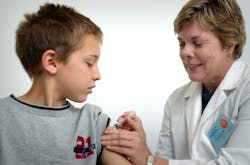The U.S. Food and Drug Administration (FDA) issued a guidance for developers of COVID-19 vaccines, the agency said in a press release.
“While the FDA is committed to expediting this work, we will not cut corners in our decisions and are making clear through this guidance what data should be submitted to meet our regulatory standards. This is particularly important, as we know that some people are skeptical of vaccine development efforts,” said FDA Commissioner Stephen M. Hahn, MD.
The guidance, Development and Licensure of Vaccines to Prevent COVID-19, provides an overview of key considerations to satisfy requirements for chemistry, manufacturing and control, nonclinical and clinical data through development and licensure, and for post-licensure safety evaluation, the FDA said.
The FDA said the goal of development programs should be to support the traditional FDA approval process, which includes producing data to directly evaluate the ability of the vaccine to protect people from SARS-CoV-2 infection and COVID-19, the disease caused by the virus. The FDA may also require post-marketing studies to further assess known or potential serious risks.
The FDA said it would expect that a COVID-19 vaccine would prevent disease or decrease its severity in at least 50 percent of people who are vaccinated.
The FDA said it believes it has the scientific expertise to evaluate potential COVID-19 vaccines – regardless of the technology used to produce or administer the vaccine. “This includes the different technologies such as DNA, RNA, protein and viral vectored vaccines being developed by commercial vaccine manufacturers and other entities,” the agency said.
The FDA also said it “strongly encourages the inclusion of diverse populations in all phases of clinical development, including populations most affected by COVID-19, specifically racial and ethnic minorities, as well as adequate representation in late phase trials of elderly individuals and those with medical comorbidities. Sponsors are also encouraged to include studies in their development plans that would provide data to support use during pregnancy, as well as plan for pediatric assessments of safety and effectiveness.”
In the guidance, the agency also stresses the importance of ensuring that “the sizes of clinical trials are large enough to demonstrate the safety and effectiveness of a vaccine.”
As a result of the COVID-19 public health emergency, the FDA also discusses in the guidance considerations regarding Emergency Use Authorization (EUA) of an investigational vaccine, and said any EUA would be made on “a case-by-case basis” and take into account “the target population, the characteristics of the product, and the totality of the relevant, available scientific evidence, including preclinical and human clinical study data on the product’s safety and effectiveness.”

